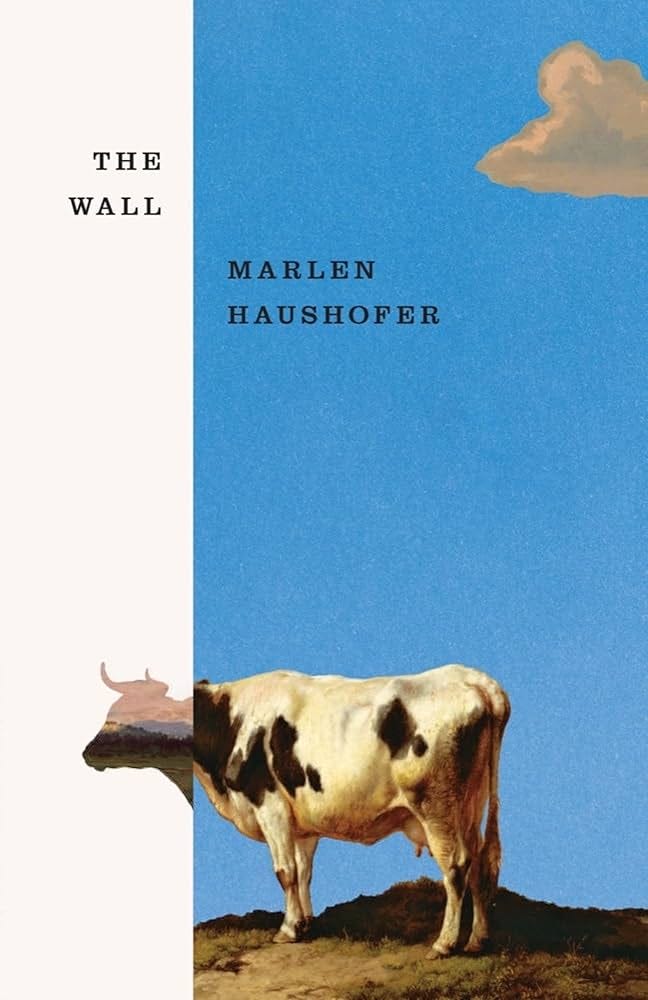Back when I was a kid, and before I became a snob, I loved Gary Paulsen’s Hatchet books. If you missed these in grade school, the basic plot of these novels involved a kid stranded in the wilderness finding ingenious ways to survive until his inevitable rescue. Besides my own outdoorsy interests – I spent my summers canoe tripping – the books thrilled in the way they intimated that you, average kid, could take care of yourself if circumstances dictated. That little kid fantasia: you’re actually an adult, too! You don’t need your parents or teachers! Little did I know just how much I needed them, or just how much being an adult would be a bit of a drag. You can take care of yourself! becomes You have to take care of yourself! in the blink of an eye, and unlike those young adult thrillers, no one comes to save you after a month or two; it’s every day, for the rest of your life. Marlen Haushofer’s excellent 1963 novel The Wall - reissued in 2022 by New Directions, and translated from the German by Shaun Whiteside – is, among the least of its qualities, a high-lit version of those old Hatchet books, a tale of survival in extreme circumstances and solitude, though its focus is more on the quotidian rather than the spectacular, with rescue never to come.
It’s funny to say that a novel that features a gigantic, inexplicable, invisible wall is realistic, but besides that wall, Haushofer’s eye is trained in all other respects on day to day reality. Our nameless narrator heads to a hunting lodge in the Austrian mountains for the weekend with her cousin and cousin’s husband, those two go into town the first night, and then they never return. Upon a bit of inspection, the narrator finds the wall, cutting across a seemingly random axis for miles and miles around; it’s hard, translucent, but not quite endless – water trickles underneath it, but who knows how deep that thing goes. Looking through the wall reveals something that’s happened on the other side, though it’s not quite clear what it is, just an eerie stillness, every living thing on that other side locked in a kind of paralysis unto death. “If this was death, it had come swiftly and softly, almost lovingly.” Where other novels might spend time trying to find out the provenance of the wall, the physics of the wall, the end of the wall, the wall in The Wall is simply a wall. It keeps the narrator in a circumscribed place, and forces her to adapt. While the wall certainly has allegorical and metaphorical meaning, the wall is also just a piece of physical reality; it works on multiple levels of meaning, but most importantly on the level of the real, just like Gregor Samsa’s transformation in Kafka’s “Metamorphosis” or Gogol’s adventurous “Nose.” Whatever it may or may not be, it’s there, and it’s not a manifestation of trauma or some mania, it is just a thing to be dealt with, one that fades into the ether of the quotidian the more time the narrator spends with it, out of sight, out of mind, why worry when there are so many more things to do for subsistence: milk the cow, cut the hay, cut firewood, check the progress of the crops you’ve planted, count your remaining matches, play with the cat, cook a meal or two, mend your clothes, lance that bothersome abscessed tooth, reluctantly go hunting, write a doomed record in your diary… it all adds up, no time to worry about the possible Cold War weapon in your midst, no time to try digging under it (save that for The Foundation Pit or The Tunnel), no time for anything besides the simple act of staying alive. (Ah, ah, ah, ah….)
Keep reading with a 7-day free trial
Subscribe to Evan Reads to keep reading this post and get 7 days of free access to the full post archives.





